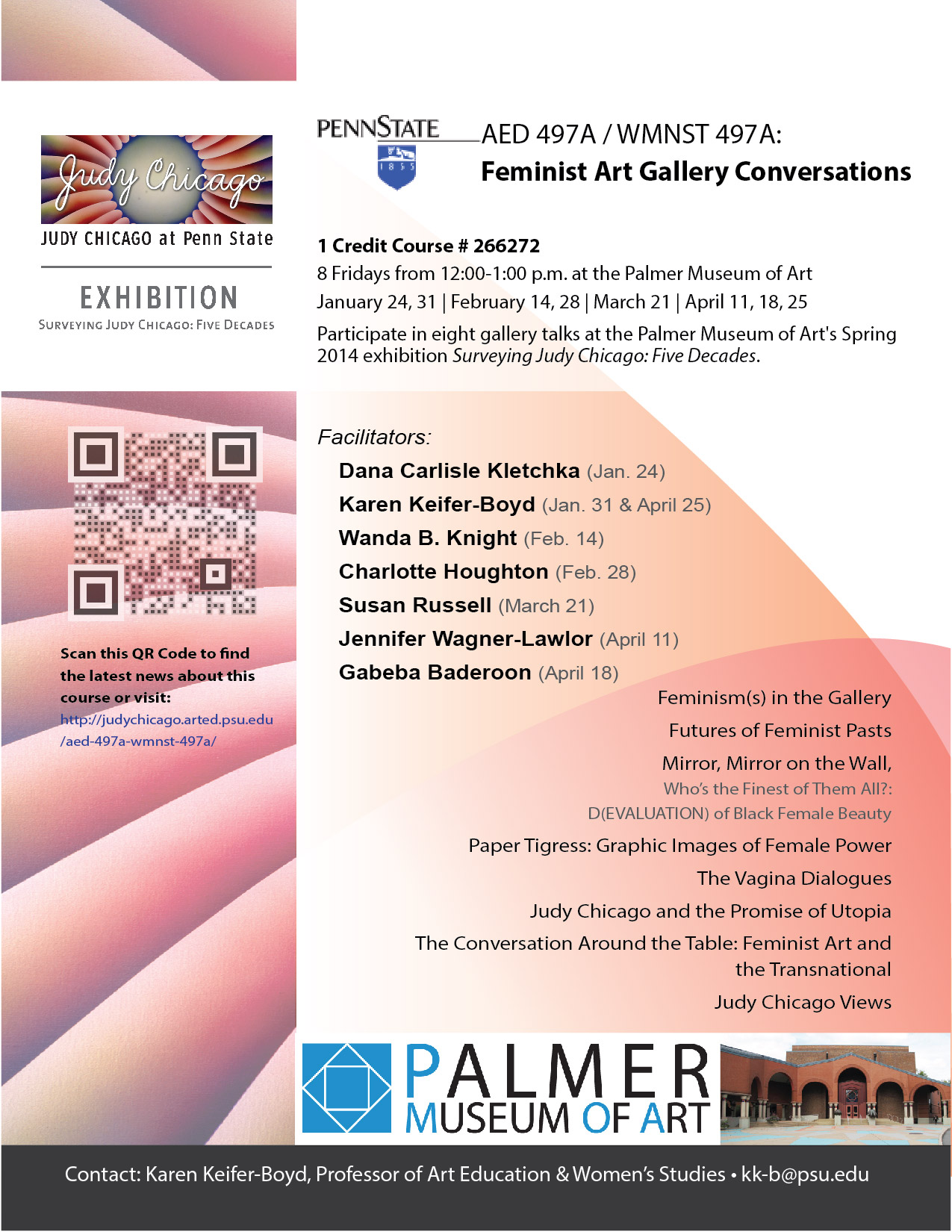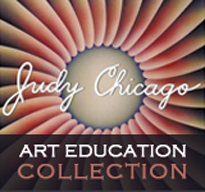
Lead Facilitator: Karen Keifer-Boyd, PhD, Professor of Art Education & Women’s Studies
Office: 210 Arts Cottage, School of Visual Arts, College of Arts & Architecture
Contact: Phone: +1 814.863.7312 Email: kk-b@psu.edu Website: http://www.personal.psu.edu/ktk2
Office hours: Email to make an appointment
Graduate Assistant: Yen-Ju Lin
Email: ywl5194@psu.edu Website: http://www.findingsquirrel.com/yenjulin/
COURSE EVALUATION
This a pass/no pass course. A passing grade requires attendance at the 8 gallery talks and response to prompts provided on the social media application set up for this purpose after each gallery talk. If unable to attend a gallery talk, a podcast will be available on the course website.
ASSIGNMENTS
The course is based on student participation in 8 gallery talks offered by the Palmer Museum of Art for the Surveying Judy Chicago: Five Decades exhibition. The public talks are scheduled from 12:10 to 1:10 p.m. on Friday afternoons. If you need to be absent, the gallery talks will be recorded and available at the course site at http://judychicago.arted.psu.edu/gallery-conversations/podcasts/
At noon, prior to gallery talk that begins at 12:10 pm, those enrolled for one-credit will meet with the instructor of the course and be given an assignment (also linked here) to respond on social media outside the museum and after class to questions specific to the focus of the gallery talks.
During the last 10 minutes of the gallery talk, there will be open discussion and students can stay if they wish, or leave as they continue to discuss online at with each other outside of the class by using the social media set up at http://judychicago.arted.psu.edu/gallery-conversations/tweets/. Instructions on how to use the social media linked here.
TECHNOLOGY FACILITIES & SUPPORT
The Patterson Building computer labs are open 24 hours a day, 7 days a week. Also Media Commons provides one on one, group, and online technology support. For particular questions on the social media set up for the course contact graduate assistant, Yen-Ju Lin at ywl5194@psu.edu.
UNIVERSITY POLICIES
Academic Integrity
University Policies and Rules Guidelines states that academic integrity is the pursuit of scholarly activity in an open, honest and responsible manner. Academic integrity is a basic guiding principle for all academic activity at The Pennsylvania State University, and all members of the University community are expected to act in accordance with this principle. Consistent with this expectation, the University’s Code of Conduct states that all students should act with personal integrity, respect other students’ dignity, rights and property, and help create and maintain an environment in which all can succeed through the fruits of their efforts.
Academic integrity includes a commitment not to engage in or tolerate acts of falsification, misrepresentation or deception. Such acts of dishonesty violate the fundamental ethical principles of the University community and compromise the worth of work completed by others.
Academic dishonesty includes but is not limited to acts such as cheating on exams or assignments; plagiarizing the words or ideas of another; fabricating information or citations; facilitating acts of academic dishonesty by others; claiming authorship of work done by another person; submitting work completed in previous classes; and/or submitting the same work to multiple classes in which a student is enrolled simultaneously.
Plagiarism is the use of more than three consecutive words, ideas, or images of another author without proper citation. Proper citation formats must follow one of the academic writing style manuals such as APA, Chicago, MLA, or Turabian. All images and text from the Internet, journals, or books must have full citation to be used in your work.
Inclusive Learning Environment
The Pennsylvania State University is committed to the policy that all persons shall have equal access to programs, facilities, admission and employment without regard to personal characteristics not related to ability, performance, or qualifications as determined by University policy or by state or federal authorities. It is the policy of the University to maintain an academic and work environment free of discrimination, including harassment. The Pennsylvania State University prohibits discrimination and harassment against any person because of age, ancestry, color, disability or handicap, national origin, race, religious creed, sex, sexual orientation, gender identity or veteran status. Discrimination or harassment against faculty, staff or students will not be tolerated at The Pennsylvania State University. AED and WMNST welcome persons with disabilities to all of its classes, programs, and events. If you need accommodations, or have questions about access to buildings where activities are held, please contact in advance of your participation or visit. If you need assistance during a class, program or event, please contact the lead faculty member for this course, Dr. Karen Keifer-Boyd at kk-b@psu.edu
An Invitation to Students Experiencing Disabilities
It is Penn State’s policy to not discriminate against qualified students with documented disabilities in its educational programs. If you need alternate arrangements or modifications to meet course requirements, please contact me during the first week of classes (see Americans with Disabilities Act, 26 July 1990, Penn State’s Nondiscrimination Policy, and the Office for Disability Services).
Health and Safety Information
Every effort will be made to comply with the intent of state laws or acts and the University Health and Safety Program in an effort to maintain a safe academic and working environment. Information and awareness of safety factors will be included in the course content when applicable.
When using a computer the main safety practice is to keep your arm, wrist, and hand in a straight line as you use the keyboard or mouse to avoid muscle stress, inflammation, and injury. Also take breaks, stretch, and look at objects in the distance periodically. Use “Text Zoom” to increase the font size of Web pages to meet your vision needs.
Click here for emergency procedures and phone numbers. Dial 911 for emergencies, (814) 863-1111 for University Police, or (814) 231-6110 for Centre Community Hospital Emergency Department. Patterson, room 304, has a phone by the podium to use (when there is not a class in session) to call off campus. Flashing lights and an alarm inside a building mean fire. Exit quickly.
The shop, located at 108 Visual Arts Building, is intended to serve the entire School of Visual Arts and is available to all students enrolled in SoVA classes who have completed the appropriate orientation. Students in the School of Visual Arts may find themselves working in the shop or in their studios or classrooms using a variety of power and hand held equipment, which may cause injury. When assisting a person who is bleeding, use disposable gloves, which are in the first aid kits in the shop and studio labs. Students should use the shop only after having received an orientation in the use of such equipment and when supervised by faculty or shop personnel. Should any injuries occur, in the shop, studios, or classrooms in the School of Visual Arts please report them to the Shop Supervisor (Matt Olson), Room 108-A Visual Arts Building, Phone: 814-865-3962, email: mjo5165@psu.edu
Attendance Policy:
Attendance is required and very important to learning in this course. However, you are encouraged to attend professional conferences, therefore, your absence in class for such attendance is excused with prior arrangements.
This course is in accordance with Faculty Senate Policy 42-27 on Attendance: The faculty senate policy, effective Fall 2002, states that students who miss class due to legitimate, unavoidable reasons such as illness, injury or family emergency should have the opportunity to make up evaluative events. While notifying the instructor in a timely manner is a key expectation, the senate policy does not mandate official documentation of student illness or other unavoidable reasons for absence. In preparing the calendar for an academic year, the University makes every effort to avoid conflicts with religious holidays. However, when conflicts are unavoidable, please notify me to make special arrangements.

Leave a Reply
You must be logged in to post a comment.